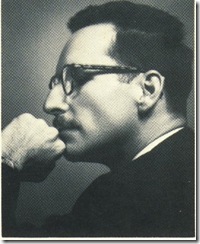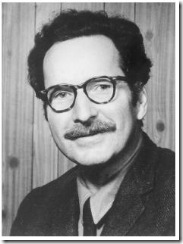Death is the one aspect of reality nobody faces without somehow masking it out of fear. That is the premise of one of the most powerful books I have ever read. Reading Ernest Becker's Pulitzer Prize-winning book, The Denial of Death, is a little like suffering from acrophobia and climbing Mt. Everest or having claustrophobia and locking oneself in a car trunk. But facing the fears in this book is far more daunting because in those scenarios just mentioned hope is still left in tact; you may eventually come down from the mountain or emerge from the trunk, or even perhaps triumphantly overcome these phobias.
But death, as this book relentlessly explains, affords no such hope. You can build foundations with your name on them, or start a prestigious family lineage, but such crass attempts at immortality, which every eternal soul encased in decaying flesh yearns, are only grasping of wind. In the end we only become worm food, a gigantic clump of what we regularly flush down the toilet. We can play more games, watch more movies, get high on more drugs, get more drunk on social status, in order to forget our mortality. But death does not forget us nor does it let us forget reality for very long.
Thanks for source of information from : Ernest Becker-WIKIPEDIA
Dr. Ernest Becker (September 27, 1924, Massachusetts - March 6, 1974, Vancouver, British Columbia) was a cultural anthropologist and interdisciplinary scientific thinker and writer.
Becker was born in Springfield, Massachusetts to Jewish immigrant parents. After completing military service, in which he served in the infantry and helped to liberate a Nazi concentration camp, he attended Syracuse University in New York. Upon graduation he joined the US Embassy in Paris as an administrative officer. In his early 30s, he returned to Syracuse University to pursue graduate studies in cultural anthropology. He completed his Ph.D. in 1960. The first of his nine books, Zen, A Rational Critique (1961)was based on his doctoral dissertation. After Syracuse, he became a professor at Simon Fraser University in Vancouver, BC (Canada).
Becker came to the recognition that psychological inquiry inevitably comes to a dead end beyond which belief systems must be invoked to satisfy the human psyche. The reach of such a perspective consequently encompasses science and religion, even to what Sam Keen suggests is Becker's greatest achievement, the creation of the "science of evil." In formulating his theories drew on the work of Soren Kierkegaard, Sigmund Freud, Otto Rank (especially), Wilhelm Reich, Norman O Brown and Erich Fromm. Becker came to believe that a person's character is essentially formed around the process of denying his own mortality, that this denial is necessary for the person to function in the world, and that this character-armor prevents genuine self-knowledge. Much of the evil in the world, he believed, was a consequence of this need to deny death.
Because of his breadth of vision and avoidance of social science specialization, Becker was an academic outcast in the last decade of his life. It was only with the award of the Pulitzer Prize in 1974 for his 1973 book, The Denial of Death (two months after his own death from cancer at the age of 49) that he gained wider recognition. The second half of his magnum opus, Escape from Evil (1975) developed the social and cultural implications of the concepts explored in the earlier book and is intended as the companion volume.
The Ernest Becker Foundation, [1], is devoted to multidisciplinary inquiries into human behavior, with a particular focus on violence, using Becker's Birth and Death of Meaning (1971), his Pulitzer Prize-winning Denial of Death and its companion Escape From Evil, to support research and application at the interfaces of science, the humanities, social action and religion.
I’d like to introduce some of the more basic concepts of Becker’s masterpiece. This self-restriction is due mainly to my lack of appropriate background and understanding of this incredibly dense book’s subject.
Becker was primarily influenced by the psychological foundation of Sigmund Freud (or more specifically, Otto Rank, one of Freud’s close associates), Norman O. Brown, and the existentialism of Søren Kierkegaard (and to a lesser extent, Blaise Pascal). Becker died in 1974 two months before this book won the Pulitzer Prize for non-fiction. He was a cultural anthropologist who sought to unite many disciplines, chief among them, psychology, philosophy and mythico-religion.
Before I dive into some summaries and quotations from the first two chapters (which were most helpful to me), let me summarize some of the broad major thoughts of the book:
1. Mankind has two parts: body and mind. Material and immaterial. The body dies and cannot continue. The mind, however, operates (or exists) in symbols: words, pictures, images, etc. These two parts of mankind are in conflict because the mind sees the dying nature of the body and wants to escape to live on past the body. However, the mind is tied to the body, and so dies when the body does.
2. If a person dwells too much on the reality of their own death, they will become despairing. They will think (rightly) that nothing done (or undone) will matter, and that death can occur (potentially) at any moment. For example, every adventure on the interstate highway system necessarily brings you very near to death. Life is fragile and fleeting. A person who dwells on this reality constantly will become depressed — and many people do. For example, they might become obsessive about handwashing. On the other hand, if a person dwells on their death in an unrealistic way, they become psychotic/schizophrenic — and some people do. The more common way to deal with death, then, is to deny it. (We’re using denial in the psychological sense, not the logical sense). The mind is in denial about its own death. It creates a self symbol that separates itself from all other existence. That is to say, we all think we will be the only one to escape death.
3. This denial of death can be illustrated by other kinds of psychological death. Of course, we would all admit that we will die someday, but we live as if we won’t. Hence, the common deathbed regrets. Further, we try to avoid reminders of our mortality. Hence, the fear of hospitals, doctors, funerals, etc. We are in denial about the possibility of death for those with whom we most closely associate — parents, children, spouses, close friends, etc. For example, in the face of all evidence to the contrary, we are surprised when a close associate dies, thinking, “I never thought she would die. She never died before. That’s not like her — she is not the kind of person who dies. She was sick…yes…but she never died before. I never thought it would happen.”
4. Death bears no hope. Ultimately, Becker has no hope for the future. He is describes the problem for which he has no prescription.
5. All of us work on immorality projects. We hope to become immortal before our body dies. We can “live on” symbolically through our children, our work, our money, our good works. In this process we deify those around us … our parents, our lovers, our leaders (religious, ideological, national, etc.). Even those who claim to be atheists seek transcendent immortality. Freud himself wanted very desperately to leave the legacy of being the Father of Psychoanalysis (and Wikipedia says he is). The two times in his life when he fainted (the most powerful denial … the mind completely shuts down in the face of threat) were both when his legacy was threatened.
Thanks to very useful information about Becker’s Book, from blogg : The Denial of Death
For Downloading Audio Book, Ernest Becker – The Denial of Death from:
FileFactory
[AUDIOBOOK] - Ernest Becker - The Denial of Death part.1 -
[AUDIOBOOK] - Ernest Becker - The Denial of Death part.2
SharingMatrix
[AUDIOBOOK] - Ernest Becker - The Denial of Death part.1
[AUDIOBOOK] - Ernest Becker - The Denial of Death part.2



2 Comentarii
I have even more of a longer biography of becker at my site:
RăspundețiȘtergerehttp://www.ernest-becker.com/biography/
Thanks for visiting my friend, you're always welcome here.
RăspundețiȘtergereI could use information from your address to me here on the blog, if you agree?
Trimiteți un comentariu